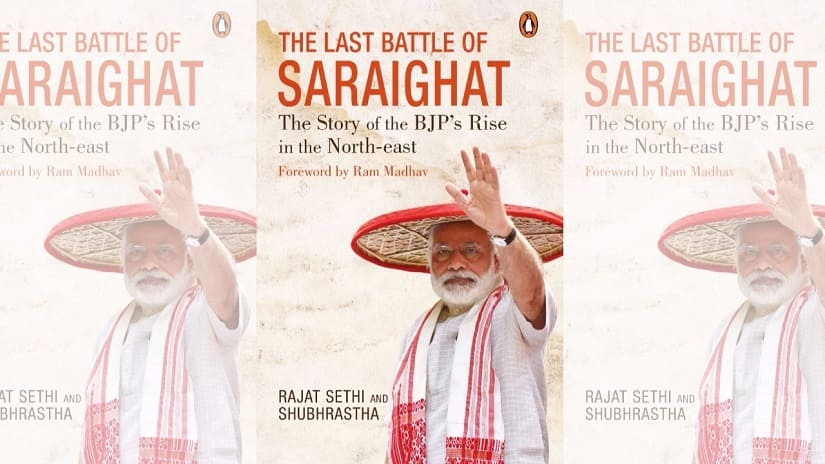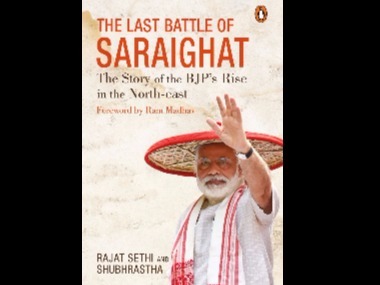The emergence of BJP as the most potent political force in the North-Eastern states, came as a surprise to the rest of the country. However, what went on behind the scenes has only been a subject of speculation in the intellectual circles. One may find many books on the ‘History of India’, but there’s hardly a piece of scholarship that will narrate the history of India, while centre-staging the developments in the North-Eastern region of the country. The Last Battle of Saraighat is that one book which has ushered in an era of the integration of the culture, politics and history of the North East, and which also talks about the success of the BJP_. (Editor’s note: the author’s original word of choice, ‘mainstreaming’, was replaced by ‘integration’ as it offered a more apt description of the phenomenon)._ [caption id=“attachment_4239107” align=“alignnone” width=“825”]  The Last Battle of Saraighat: The Story of the BJP’s Rise in the North-east[/caption] The reader will be pleasantly surprised to see that the book is actually more about the contemporary history and politics of the region, rather than just being an account of how the BJP won a particular election. At the same time, the text is so objective, that the reader will hardly ever realise that the authors campaigned for one particular party. The authors have meticulously traced each and every development of contemporary relevance of Assam to the rich history it has. The text is so well researched that a casual reading is almost impossible. The factual narrative is illuminating and the reader is forced to empathise with the politics and contemporary developments in the state. It highlights the complete apathy of Delhi towards Assam; how the politics of Delhi, starting from the period before independence, was always dismissive of the interests of the people of Assam. The book notes that Nehru was willing to sacrifice the autonomy of Assam for the sake of preserving the Cabinet Mission Plan. Gandhiji had to decisively intervene in favour of the Assam Pradesh Congress Committee’s (APCC) view, and against Nehru’s. The authors conclusively show that the issue of preservation of separate identity of Assam was mishandled by the Nehru administration to make it an issue of Assamese independence. It is indeed ironic then, that the book was launched at the The Nehru Memorial Museum Library (NMML). Nehru’s mistakes are interestingly related to those of his great-grandson, Rahul Gandhi, when he preferred to play with his dog at a meeting with top Congress leaders from Assam. The authors critique the Indian model of federalism under the Constitution, on how it’s centralising tendency fuelled separatism in states like Assam, which has been one of the persistent criticisms of our Constitutional framework, even within the legal community. The purpose of invoking so much history, as claimed by the authors, is that the Assam election was not fought on the issues of development, caste or corruption but on historical narratives. It has been emphatically demonstrated that the issue in Assam has always been that, as evidenced by the fact that debate over illegal migration has been consistent in all elections in Assam post-independence, even till today. The issue of Bangladeshi illegal migration, though very much present in the national consciousness is filled with interesting details. For instance, one wouldn’t know that the chief escretary of the then East Pakistan could just come to Shillong for spending his summer holidays, without any official documentation at all. The Nehru led union government wouldn’t object to it. The book accurately documents the failure of idealism of Nehru in Assam, which is also visible elsewhere. The authors dedicate a full chapter on the enormous role of Rashtriya Swayamsevak Sangh (RSS), in the present success of the BJP. It is interesting to note that the RSS had put in decades of hard work, since independence, to bring forth the nationalistic narrative which eventually resulted in a win for the BJP in Assam. The book offers us a refreshing perspective on how elections should be fought and won, where issues are based on historical narratives and not on vote banks. If someday this were to happen across the country, then indeed our democracy would be a better one. Lastly, the foreword by Ram Madhav, who is the national general secretary of the BJP, in charge of the North-east region, is also very enlightening, where he reveals the key to success for his party: ‘Even in the desire to look and sound national, one should not disrespect or discard (this) diversity and uniqueness’. Although well-written, the book lacks editing at some places. It also cuts short a lot of interesting historical accounts; however, this must be condoned because the relevance to the main subject matter of the book has to be maintained. Anyone who is even slightly interested in the history and politics of the region, must read this book. Precise and short, it is as quick a read as it is informative.
The Last Battle of Saraighat offers a compelling and well-researched account of the BJP’s rise in the North-east
Advertisement
End of Article


)



